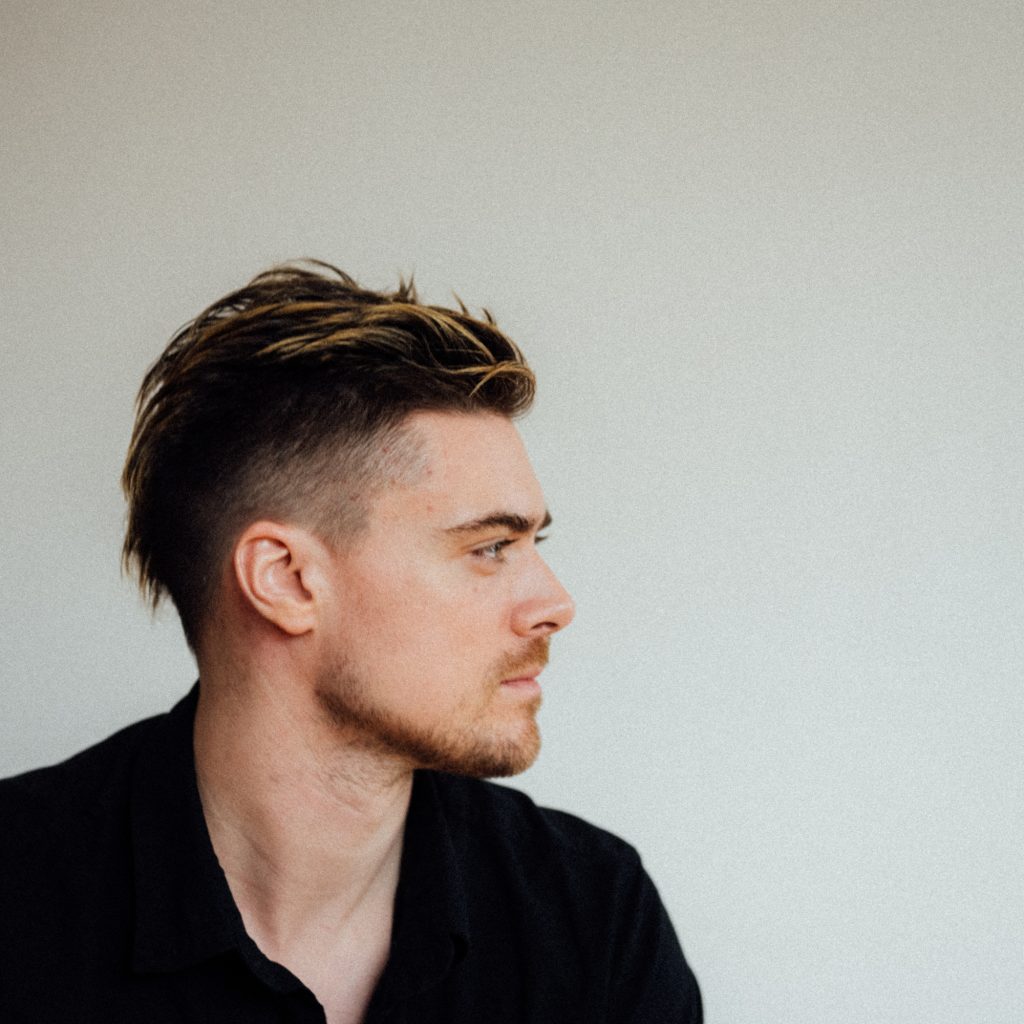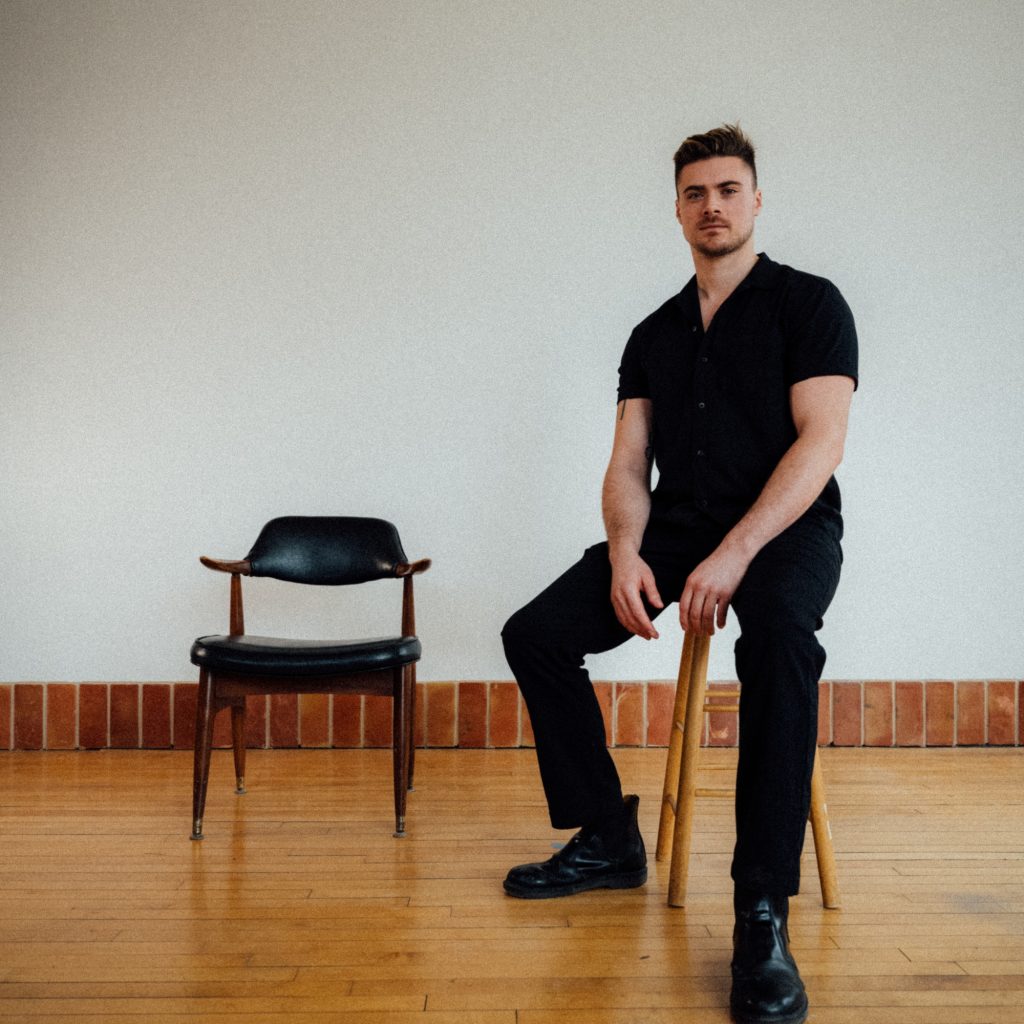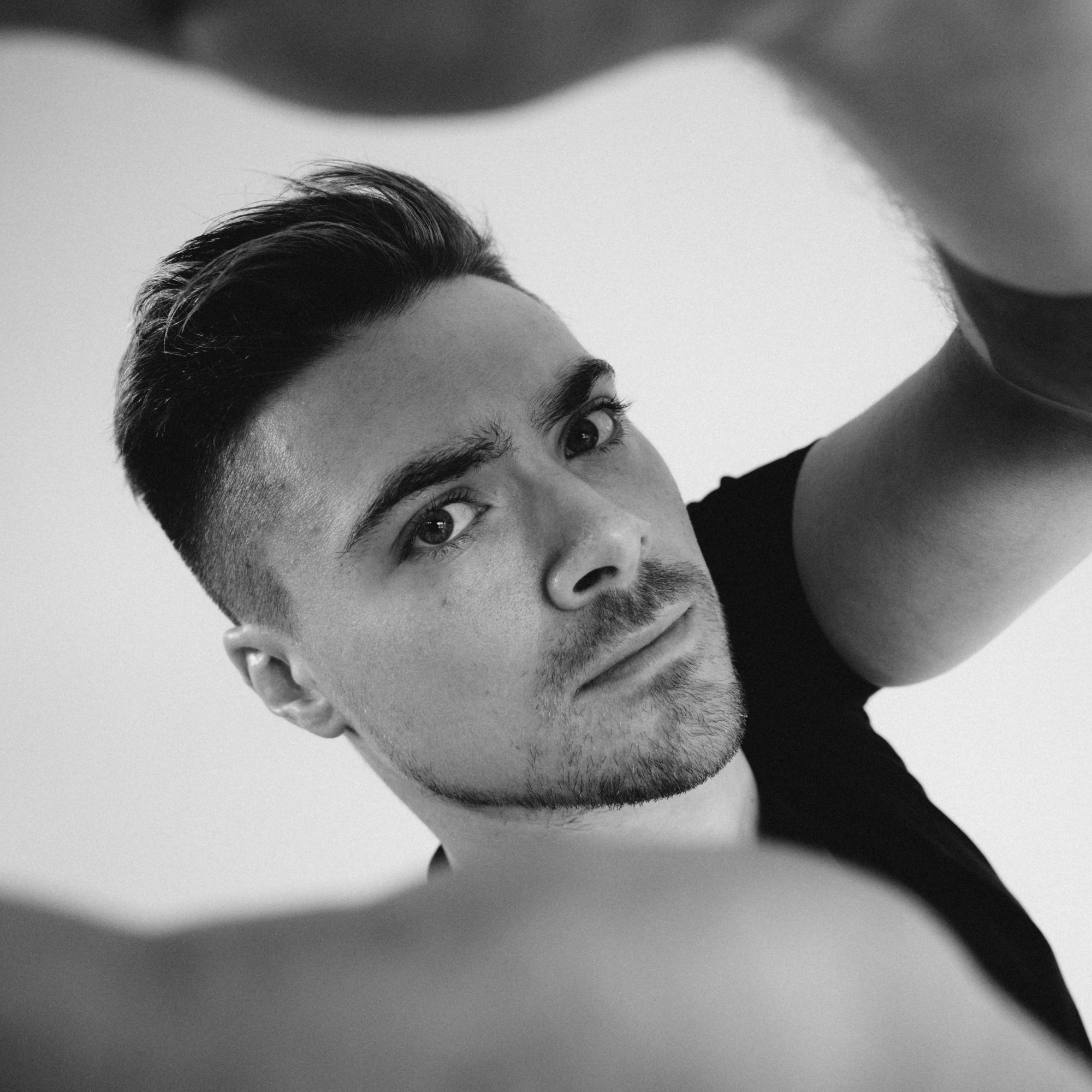Charlie Werber is a well-known drummer in the Chicago underground music scene, having played with local experimental noise acts, like Murmur and Lovely Little Girls.
On June 20th, Charlie released his first track as a solo artist, called “Krater,” a hypnotic twenty-two-minute-long odyssey that, through the use of drums alone, brings you on a grand journey. The B-side features additional instrumentation and vocals from the revered British experimental musician, Daniel O’Sullivan, of Sunn O))) fame.
Back in May, Charlie spoke with Post-Burnout about his background, the track, working with Daniel, the Chicago music scene, why now was the right time to release solo material, and much more.
—
Starting with your background – getting into music, getting into drums – where does that take us?
Yes. You mean the very first impulse to play drums?
Well, I guess, just your background as a music fan.
Sure. Lots of prog rock. That’s kind of where most of it started. I got super into King Crimson in high school. The Discipline album was the first one that I got really super into. The way that all the rhythms interlocked and interweaved, I think that continues to be an influence today.
And then, actually getting into drums, yourself, as a player?
Yeah. Just being an angsty teenager [Laughs] and needing some sort of outlet for all of that energy, and, yeah, just the cathartic nature of the physical movement channelled into expression.
Were you self-taught, or were you formally taught?
A combination of the two. I mean, I had lessons growing up in high school, which I’m thankful for, and then I progressed into a music school in college, which really made me feel that I was occupying two different worlds; there was sort of the academic, having to make these certain marks in a more regimented way, and then there was the music that I liked to create on my own, which felt like a…Not that school was that restricting, but when I got to use my own voice outside of school, that felt very freeing.
Do you think that having that formal training… – once you know the rules, you know how to break it – …was that beneficial to you, in terms of having that sort of foundation of how to do things, quote-unquote, “the right way,” and then doing things how you actually want to express yourself, do you think that foundation was kind of essential?
I think so. I think in developing a vocabulary, you just sort of develop your own…Or you learn all these different words from school, and then you can use them in a way to articulate what you would like to articulate.

Courtesy of Discipline PR
When it comes to knowing theory, knowing the terminology, the lexicon, and all that, do you think that translates to the actual pragmatic approach? Is that something that you have consideration for, or do you think a lot of it is an emotive response? Because, as you were mentioning, a lot of it is a means of channelling what’s going on in your head. Do you find that music theory or those elements supersedes that, or do you think that your intuitive nature takes over? Sorry, that was a long-winded question. [Laughs]
[Laughs] No, no! It’s a good question! I think a bit of both. So, a lot of the music that I do tends to gravitate around polymeters – like, using different numbers on top of each other – and that’s something that I can think of in terms of technique, but there’s also an intuitive nature that numbers have. I feel like the personality of the numbers, as they’re in relationship to each other, is, to me, where those two worlds of technique and intuition meet.
You’ve also played in a litany of bands, and very different-sounding bands, and do you think having that variety, in terms of acts you’ve played with…Well, first of all, was that something you sought out when playing with other artists? Did you seek out versatility? How did you end up in the projects you’ve played with?
Yeah. Did you mean on a practical level?
Well, for you, as part of expanding your own education, your own foundation, were you seeking out the variety that your discography has, or were those just the opportunities that were available to you at the time, and that’s why you went for them?
Yeah, it just sort of happened that way! [Both laugh] I don’t think I was…Getting to know a community of musicians that occupy more of a niche, it’s sort of a case that everybody knows everybody else. I just sort of ended up playing with the people that you know and love.
What is the Chicago music scene actually like, from your perspective? I mean, it’s such a legendary music scene, such a versatile range, as you were mentioning, but I’ve never been to Chicago, myself, so I don’t have that frame of reference, personally, but is it sort of compacted enough that you can have that sense of community, or is it more dispersed?
Um…[Laughs] Well, when I said “Sense of community,” I was speaking, in my case, more historically. Right now, I don’t have a good feel for what the music scene here is like at all. [Laughs] I have a sense that there’s a sort of tight-knit community that I might be on the outside of. But, yeah, I had a period where I moved away for several years. I was living in Chicago up until 2015, and then I left, and then I came back in 2020. Some of it seems the same, but a lot of it seems very different, and I still haven’t quite figured that out yet.
That’s fair. You mentioned that, in 2020, you came back. I mean, obviously, that’s COVID, that’s the pandemic and stuff like that, so I was wondering, were you able to be active in any way at that time? I’m not sure how restrictive the lockdowns were where you are.
During COVID, no. I played pretty much zero drums during COVID. It was just a time when the focus was drawn towards other things.
Did that have any influence on your creative musings? You were mentioning that you weren’t playing drums, but I speak to a lot of different kinds of creative people, and the COVID pandemic – seemingly globally, everywhere – everyone I talk to seems to have similar feelings on it. So, I was wondering, was there anything there sparking what the future could bring, in the sense that, “Once this is over, here’s what I plan on doing,” or was it just complete lethargy? [Laughs]
[Laughs] Definitely a combination of those things! I was living in California when COVID started, and then I moved back to Maryland, where I’m originally from, for about a year, and I was oscillating between whether to move back to Chicago or move back to California. I had occupied what I would describe as an eerie space when I was in California, where I felt like I was sort of floating. And, to me, Chicago represents this denser, more concrete energy, so it occurred to me that I needed to move back into that sort of denser energy. I know that sounds incredibly vague!
No, no! Actually, I get it! It sounds very concrete to me, actually! [Laughs]
[Laughs] OK, good!
No, it really does. Something I’m very interested in, I guess, is how these things like geography affect…Because, obviously, where you are at a time in life will kind of affect your mood and your thoughts. Our emotions and our sense of being are really just chemicals in our brain, so to speak. So, I’m actually quite interested in how geography affects creative output. I’m also kind of interested in weird things – like how people who are nocturnal and [create] in the wee hours, versus people who do things in the sunshine, and even stuff like that – how it affects your output. Are you interested in that abstract way of how external stimuli affect your own creative output?
Yeah, but I also think it’s true in reverse, where you might find yourself in a certain place because of an internal atmosphere.
Sure.
So, I don’t know if I would cut it…[Considers] Hmm. Yeah, that’s interesting to think about.
It’s very funny, because when I was listening to the tracks you’re about to put out, and I was kind of letting it wash over me – we’re talking about “Krater,” now, for reference – it’s two instrumentations, and the first one, in particular, is solely drums, and it was interesting to me, the atmosphere it created in my own mind. I don’t know if this was your intent, but, for me, it was kind of meditative. Oddly enough, it did create that kind of floaty atmosphere that you were describing, at least in my mind. Are you interested in the interpretations that…With instrumentations, I think there’s a lack of authorial intent, in the sense that you’re not giving lyrics that spell everything out. Are you interested in hearing how different people react to the art you’re putting out?
Yeah, absolutely.
I also want to talk about the second side. You worked with Daniel O’Sullivan, and I was wondering how that collaboration came about.
I had appreciated his work for a really long time, and I contacted him, and we started working on it! [Laughs]
[Laughs] So, it was that simple?
[Laughs] Yeah, essentially! Like, I’m trying to think of how to elaborate on that! It was, basically, that simple. We talked very briefly about ideas I might have for him, but they were very general and very loose, and, somehow, he managed to create something that was, in my mind, absolutely perfect for the piece.
So, maybe if we could discuss exactly how the second track came about. Obviously, the first side is you, and the second side has the additional instrumentation and vocalisation on top of that. So, I was wondering, did you just give him the drum track and that’s what he came up with, or was it more collaborative?
Yeah, all of the voice, all of the other instruments, are all Daniel, basically, taking the thing and running with it.
That’s cool! What’s it like to have someone that you’re a fan of and appreciate invests so much in your output that they’re willing to take the time, get inspired by your own output, and [contribute to it]? How does that feel?
Well, it’s gratifying, of course. The structure of the record, in the way that I’m alone on one side, and I’m collaborating with somebody else on the other side…I suppose you can look at the structure of the record as being archetypal, in a way, where there’s the solitary nature on one side, and the collaborative nature on the other side; or like, say, there’s this time period that I spent in California, where it’s more airy, and this time when I’m in Chicago, and it’s more concrete. I look at it as the coming together of those two things.
Was that your intent from the beginning, or is that just how it eventuated?
It just happened that way, where all of the details of the record started to emerge, and they just happened to reflect this larger cosmology. There’s an experience of… – it might sound strange – …an egg being laid in my head. [Laughs] So, several years after that experience…and the record I was making just happened to reflect all the details of that experience.
And one final thing I’ll mention before I let you go – as I mentioned, you’ve been doing music now for so long, so why do you feel like now is the right time, or this was the right material, to release eponymously?
It had enough energy behind it. I just never had that, sitting in the back and working in more of a band context for my entire life. It felt like time to see what would happen if I initiated something on my own.

Courtesy of Discipline PR
And do you think this is something that you plan to continue with, or is it just if the material is right for you to release it under your own name, you will? What’s your relation to that? Do you plan on releasing material under your own name as an extended project, or do you feel that that’s putting pressure on the art that’s not conducive? Because when you start a musical project, there’s an expectation of continuous releases, but I don’t get that impression; I get the impression that, for you, it’s more what’s right. I don’t know if that’s a misinterpretation.
No, I think that’s right on. With the recording sessions for the pieces that I’m releasing now, I recorded a bunch of other drum stuff, which may be released. I don’t know where that’s going to go in the future. They may be similar sorts of collaborations, but I didn’t have the same intention behind those pieces that I just sort of cranked out in the studio with “Krater.”
So, they’ll be released if you feel they’re right?
Yeah. More work would need to go into them, but I’m definitely in the camp that I’m not going to do something unless it feels one-hundred-per-cent right.
One thing… – and this might be a strange question, but I just thought of it as we were speaking – …but we were talking about how with instrumentations, it opens up a litany of interpretation, but, obviously, you have to title the songs. Do you ever worry that the title you’ll give a track or a piece will, in some way, impose an interpretation on the listener?
I think because the symbolism – if you can call it “symbolism” – of the piece that I created is so universal and sort of archetypal, it basically just ends up being a mirror, and I think it’s quite easy for people to superimpose whatever their…Well, in some sense, I don’t think it’s a superimposition, because whatever someone’s reaction to it is true, necessarily. But, along with that, “Krater” refers to a Greek vessel, and so it can just be the container for the people’s perception, whatever that is.
Charlie Webber’s debut release, “Krater,” can be streamed and purchased through Bandcamp. You can keep up with Charlie on Instagram.

Aaron Kavanagh is the Founder and Editor-in-Chief of Post-Burnout. His writing can also be found in the Irish Daily Star, Buzz.ie, Totally Dublin, The GOO, Headstuff, New Noise Magazine, XS Noize, DSCVRD and more.

 POST-BURNOUT
POST-BURNOUT